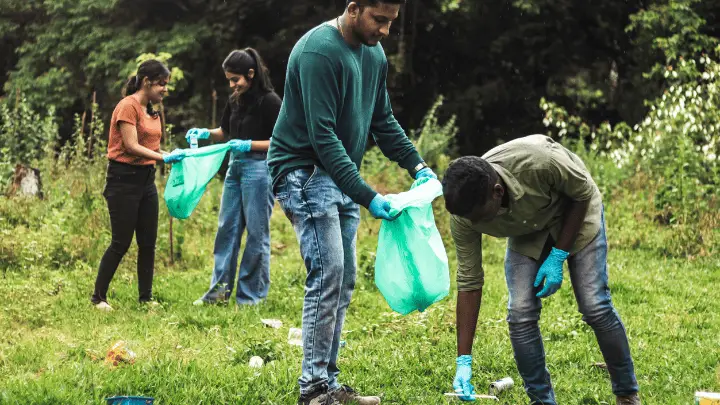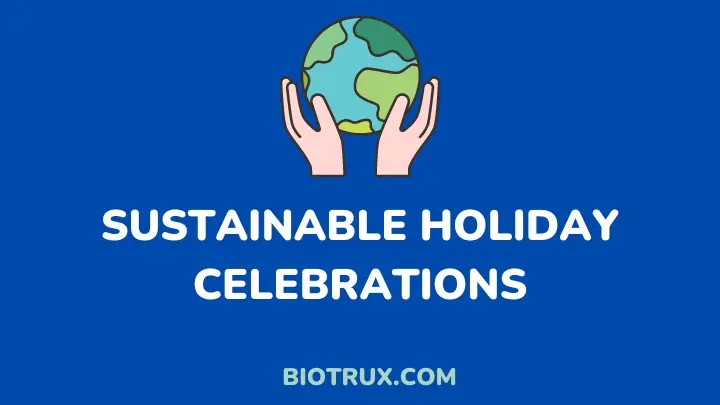Did you know that every month has one, two, or more days dedicated to sustainable holiday celebrations? Interesting right? With so many events and parties to attend, it’s easy to get caught up in the excitement and forget about our impact on the environment.
But there are plenty of ways to enjoy the festivities while still being mindful of our planet. In this article, you’ll explore several sustainability-related events and days to incorporate into your holiday celebrations.
From eco-friendly gift-giving to reducing food waste, there are plenty of ways to make this holiday season enjoyable and sustainable. So let’s dive in and discover how we can all positively impact this holiday season.
Monthly Sustainable Holiday Celebrations

Engaging in sustainable holiday celebrations is a fantastic and responsible way to lessen your ecological footprint while fostering eco-conscious behaviors. To aid in this pursuit, I have compiled a comprehensive list of sustainable holiday concepts for every month of the year.
January
- New Year’s Resolutions for Sustainability: Start the year green by setting achievable eco-friendly objectives.
- National Cut Your Energy Costs Day (January 10): It’s important to be mindful of your energy usage and see where to cut back.
February
- World Wetlands Day (February 2): Discover the importance of wetland conservation and contribute to safeguarding these precious ecosystems.
- World Pangolin Day (Third Saturday in February): Spread the word about protecting the pangolins and their habitat. You can also learn more about other endangered animals.
- National Battery Day (February 18): Learn about the batteries that power our devices and how to dispose of, replace, or recycle them properly.
- World Whale Day (every 3rd Sunday in February): Do your part in preserving the majestic whales and the health of our precious oceans.
- International Polar Bear Day (February 27): Donate to a polar bear conservation organization if you can. You can also educate yourself and others about the impacts of climate change on polar bears and the Arctic ecosystem.
- This is also black history month.
March
- World Wildlife Day (March 3): Learn about wildlife and appreciate biodiversity, extinction status, and conservation efforts.
- International Day of Action for Rivers (March 14): Make a splash for our rivers and water conservation! It’s crucial to spread the word about their importance.
- Global Recycling Day (March 18): Celebrate Global Recycling Day by separating recyclables from trash, donating gently used items, and educating others on waste reduction.
- International Day of Forests (March 21): Promote the cause of maintaining our forests and ensuring that our forestry practices are sustainable for the long term.
- World Water Day (March 22): Encourage preserving water and providing safe drinking water for all.
- World Meteorological Day (March 23): Recognize and appreciate the crucial role that National Meteorological and Hydrological Services play in ensuring the safety and welfare of our society. Their contributions are essential and should be celebrated.
- Earth Hour (Last Saturday in March): Participate in the enjoyment by reducing the brightness of unneeded lights for one hour.
April
- Fossil Fools Day (April 1): Spread the word about the serious environmental issues caused by the burning of fossil fuels. Addressing this matter and taking action to protect our planet is crucial.
- World Aquatic Animal Day (April 3): Involves various awareness-raising efforts to educate people about the different species of animals that inhabit our oceans, rivers, and other bodies of water.
- World Health Day (April 7): On World Health Day, people worldwide come together to raise awareness about important health issues and promote healthy living.
- Earth Day (April 22): Participate in environmental activities and advocate for sustainability.
- National Park Week (April 22 – April 30): Explore the wonders of the numerous national parks and national park sites throughout the United States.
- Arbor Day (Last Friday in April): Although some states may observe it on different dates, it is a day that encourages the planting of trees and promotes forest restoration.
May
- World Migratory Bird Day (Second Saturday in May): Support bird conservation efforts.
- World Bee Day (May 20): Learn more about our pollinators and other essential roles that bees play in the ecosystem.
- World Turtle Day (May 23): Celebrate and raise awareness about protecting and conserving these amazing creatures.
- Bike to Work Day (Various dates by location): Promote eco-friendly transportation.
- International Day for Biological Diversity (May 22): Focus on biodiversity conservation.
- Endangered Species Day (third Friday in March): Endangered Species Day is a time to raise awareness and take action to protect threatened wildlife. Take time to learn about endangered species and support conservation efforts.
June
- World Environment Day (June 5): Celebrate and raise awareness about global environmental action.
- World Food Safety Day: (June 7): Help prevent, detect, and manage foodborne risks to improve food security and human health, reduce food waste, promote economic prosperity, agriculture, market access, tourism, and sustainable development.
- World Oceans Day (June 8): Prioritize ocean conservation efforts since our oceans are significant in sustaining life on Earth and serve as a vital source of food, transportation, and recreation.
- Global Wind Day (June 15): Promote wind energy and renewable resources.
July
- National Clean Beaches Week (July 1–7): Acknowledge and fully support the significance of maintaining clean and pristine beaches.
- International Plastic Bag Free Day (July 3): Raise awareness about plastic bag pollution.
- World Population Day (July 11): Spread the word about the important global population issues. We must raise awareness and take action to address these pressing concerns.
- World Nature Conservation Day (July 28): Highlight the importance of conserving natural habitats.
- Plastic-Free July: Commit to reducing plastic use throughout the month.
August
- United Nations: International Day of the World’s Indigenous People (August 9): Indigenous peoples’ contributions to global issues like environmental protection are recognized and celebrated.
- International Youth Day (August 12): Focus on empowering young people to engage in sustainability efforts.
- National Honey Bee Day (Third Saturday in August): Promote the importance of honey bees in pollination and biodiversity.
September
- National Wildlife Day (September 4): Advocate for wildlife conservation and protection.
- International Day of Clean Air for Blue Skies (September 7): Raise awareness about air quality and its impact on health.
- Zero Emissions Day (September 21): Spread the word about the devastating impact of carbon emissions and fight for a future free from air pollution.
- World Car-Free Day (September 22): Encourage sustainable commuting.
- World Cleanup Day (Third Saturday in September): Join a global effort to clean up litter and plastic waste.
- International Coastal Cleanup Day (Third Saturday in September): Help clean shorelines and protect marine ecosystems.
October
- World Vegetarian Day (October 1): Encourage and spread the word about the positive impacts of adopting a vegetarian lifestyle.
- World Habitat Day (First Monday in October): Focus on sustainable urban development and affordable housing.
- Global Handwashing Day (October 15): Promote hand hygiene for public health and water conservation.
- World Food Day (October 16): Address food security issues and sustainable agriculture.
November
- America Recycles Day (November 15): Encourage recycling and reducing waste in everyday life.
- World Toilet Day (November 19): Advocate for improved sanitation and clean water access.
- Buy Nothing Day (Fourth Friday in November): Promote mindful consumption and less materialistic holidays.
December
- International Mountain Day (December 11): Raise awareness about mountain ecosystems’ importance and conservation.
- World Soil Day (December 5): Focus on soil health and the critical role of soils in agriculture and the environment.
Throughout these sustainable holiday celebrations, you can learn about, participate in, and act on various sustainability-related issues. Whether you aim to conserve wildlife, reduce waste, promote clean energy, or support local communities, you can participate in these events.
FAQs
What are sustainable holiday celebrations, and why are they important?
Sustainable holiday celebrations are environmentally conscious and responsible ways of celebrating traditional holidays. They are important because they help reduce the environmental impact of excessive waste, energy consumption, and consumerism during the holiday season.
How can you make your holiday decorations more sustainable?
To make your holiday decorations more sustainable, use LED lights, choose decorations made from recycled or upcycled materials, and incorporate natural elements like pinecones and dried fruit. Additionally, consider creatively reusing decorations from previous years and minimizing the overall number of decorations to reduce waste.
What are some eco-friendly gift-giving ideas for the holidays?
Eco-friendly gift-giving ideas include selecting gifts from sustainable materials or organic products and supporting local artisans and businesses. Another option is gift items encouraging sustainability, such as reusable shopping bags, bamboo toothbrushes, or solar-powered gadgets.
Final Thoughts
In conclusion, there are endless possibilities for sustainable holiday celebrations. From participating in a community tree planting event to hosting a zero-waste holiday party, there are plenty of ways to reduce our environmental impact during this festive season.
By taking small steps towards sustainability, we can all make a difference in preserving our planet for future generations. Let’s make this holiday season one that is both joyous and environmentally friendly. Make sustainability a part of your lifestyle.
If you are still unsure how to live sustainably, here’s a guide to teach you how to live a sustainable lifestyle on a budget.
Thanks for reading.

